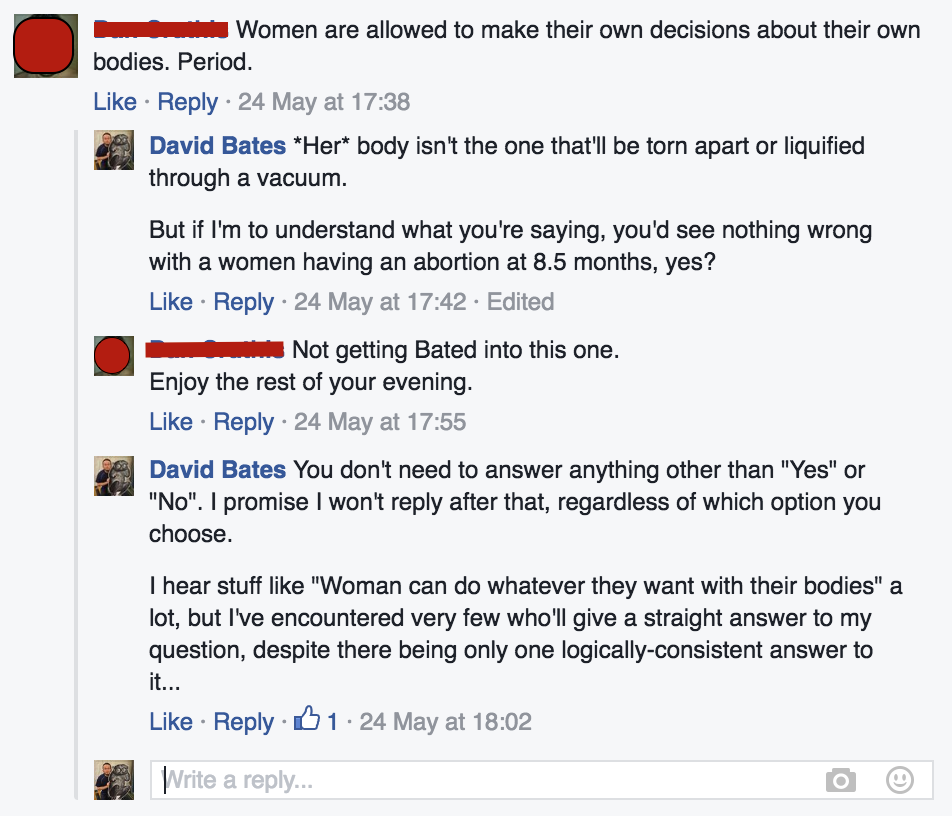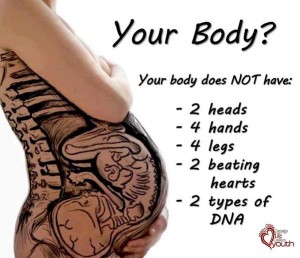Quick Apology: Doing whatever you want with your body?

Today’s post is a follow-up to the one last Thursday. In response to my comments about the differences between circumcision and abortion, a friend-of-a-friend offered a reply. However, rather than responding to what I said, he simply trotted out a favourite slogan of the pro-choice moment. Here was our exchange:

“My body, my choice” is one of the favourite sayings of those who favour the continued legal access to abortion. However, the statement is patently false and I would suggest that nobody really believes it.
In principal and in pregnancy
 We place limits on what people can and cannot do with their bodies all the time. When these limits are violated we use names to describe it, such as “assault” and “rape”. So as a general principle, no, we cannot do whatever we want with our bodies…particularly when it affects another person’s body in a negative fashion.
We place limits on what people can and cannot do with their bodies all the time. When these limits are violated we use names to describe it, such as “assault” and “rape”. So as a general principle, no, we cannot do whatever we want with our bodies…particularly when it affects another person’s body in a negative fashion.
Returning to the specific subject of pregnancy, I would like to draw upon an example from the 1960s. Back then, Thermaldahide was used by doctors to combat morning sickness, but unfortunately the drug was found to cause serious deformities in the children of those pregnancies. Now, if a woman truly can do whatever she wants with her body, it would follow that she should have the right, if she so chooses, to take thermaldahide even if she knows the effects it could have on the child. I would hope that the conscience of everyone reading this article would respond with a hearty “No!”, once again showing that we do not have completely free reign over what we do with our bodies.
The unanswered question
Please consider the above Facebook exchange and note the very simple question asked. If he truly believes that women can do whatever she wants with “her” body, then he should endorse a woman choosing to have an abortion a week before giving birth, right?
Even now, several weeks later, I have received no reply from him. No matter how often I hear the rhetoric about women doing whatever they want with their bodies, it is extremely rare to receive a clear answer to this question. The reason for this is that answering this question places the pro-choice advocate in a rather awkward position:
Options #1: No
If he would not be okay with a woman aborting shortly before birth (which I suspect is the case), he undermines the “My body, my choice” rhetoric, since he concedes that there are some things which she can’t do with her body and that there are some choices which are not actually okay.
Option #2: Yes
However, if he says that a woman should be allowed to abort her child at any point for whatever reason, he will appear callous. This unveils the central argument of abortion, showing it in all its ugliness: that a person’s life is only of value if it is wanted…otherwise that life is entirely disposable.
(Additionally, if he places no restrictions on abortion he must automatically abandon all the arguments which attempt to justify abortion based on viability, level of development, or the ability to feel pain etc)
How is a pro-life apologist to respond? How does he get out of this bind?
An attempted answer
On the rare occasions when I’ve heard the question answered, it’s usually something along these lines:
“Well, I don’t like the idea of a woman aborting her child just before birth, but I’d absolutely defend her right to do so. Her body, her choice.”
Although this answer attempts to make the pro-choice position more principled and dignified, I’m afraid it’s no less horrific. He still thinks that a mother should be able to have her child killed!
Fortunately, receiving this answer can help us who are pro-life to move the conversation forward. The pro-choice advocate has just expressed at least some level of disapproval of abortion. This creates an opening for a follow-up question:
“Why don’t you like the idea of a woman aborting her child just before birth?”,
Asking this question can help us get to the question which is at the real heart of the abortion debate: what are the unborn?
What I find the “my body, my choice” ultimately means “my time, my money, my happiness, my future”. The selfish view on the unborn is what worth will it have to them. Some view the unborn as unwanted. Unwanted financial burden, unwanted physical burden, unwanted time commitment.
Your last sentence is THE whole issue (no pun intended). The faster any conversation gets to that point, the sooner a resolution to this question can be reached. To argue that the unborn is not a human life is to deny science/biology. To argue that it is a human life is to deny the rights of one over another. Neither of these two positions are logically viable.